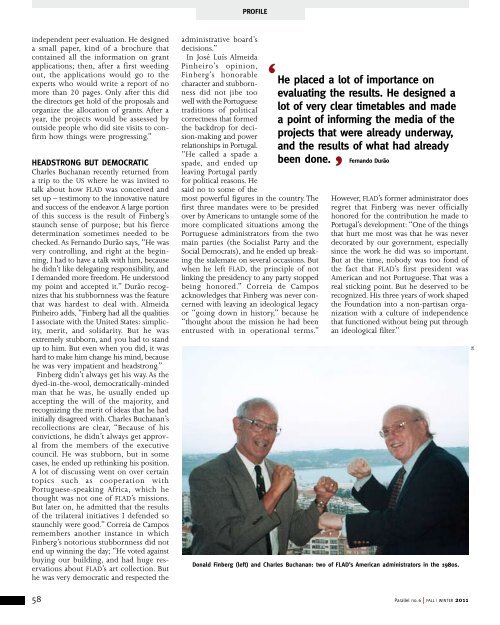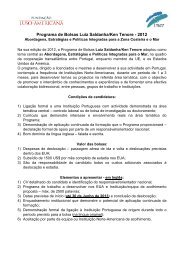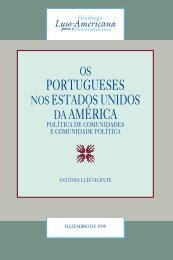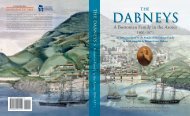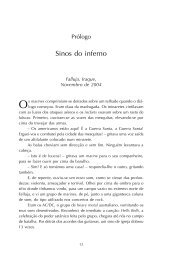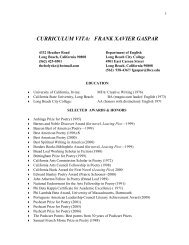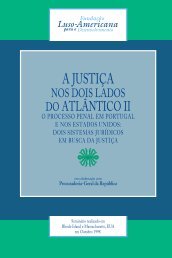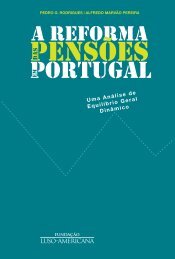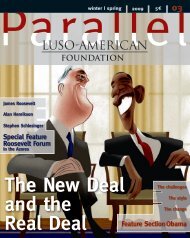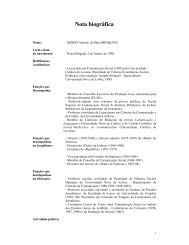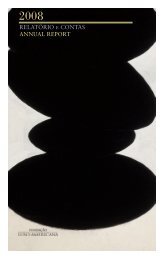A decade later - Fundação Luso-Americana
A decade later - Fundação Luso-Americana
A decade later - Fundação Luso-Americana
You also want an ePaper? Increase the reach of your titles
YUMPU automatically turns print PDFs into web optimized ePapers that Google loves.
independent peer evaluation. He designed<br />
a small paper, kind of a brochure that<br />
contained all the information on grant<br />
applications; then, after a first weeding<br />
out, the applications would go to the<br />
experts who would write a report of no<br />
more than 20 pages. Only after this did<br />
the directors get hold of the proposals and<br />
organize the allocation of grants. After a<br />
year, the projects would be assessed by<br />
outside people who did site visits to confirm<br />
how things were progressing.”<br />
HeAdsTronG BuT democrATic<br />
Charles Buchanan recently returned from<br />
a trip to the US where he was invited to<br />
talk about how FLAD was conceived and<br />
set up – testimony to the innovative nature<br />
and success of the endeavor. A large portion<br />
of this success is the result of Finberg’s<br />
staunch sense of purpose; but his fierce<br />
determination sometimes needed to be<br />
checked. As Fernando Durão says, “He was<br />
very controlling, and right at the beginning,<br />
I had to have a talk with him, because<br />
he didn’t like delegating responsibility, and<br />
I demanded more freedom. He understood<br />
my point and accepted it.” Durão recognizes<br />
that his stubbornness was the feature<br />
that was hardest to deal with. Almeida<br />
Pinheiro adds, “Finberg had all the qualities<br />
I associate with the United States: simplicity,<br />
merit, and solidarity. But he was<br />
extremely stubborn, and you had to stand<br />
up to him. But even when you did, it was<br />
hard to make him change his mind, because<br />
he was very impatient and headstrong.”<br />
Finberg didn’t always get his way. As the<br />
dyed-in-the-wool, democratically-minded<br />
man that he was, he usually ended up<br />
accepting the will of the majority, and<br />
recognizing the merit of ideas that he had<br />
initially disagreed with. Charles Buchanan’s<br />
recollections are clear, “Because of his<br />
convictions, he didn’t always get approval<br />
from the members of the executive<br />
council. He was stubborn, but in some<br />
cases, he ended up rethinking his position.<br />
A lot of discussing went on over certain<br />
topics such as cooperation with<br />
Portuguese-speaking Africa, which he<br />
thought was not one of FLAD’s missions.<br />
But <strong>later</strong> on, he admitted that the results<br />
of the tri<strong>later</strong>al initiatives I defended so<br />
staunchly were good.” Correia de Campos<br />
remembers another instance in which<br />
Finberg’s notorious stubbornness did not<br />
end up winning the day; “He voted against<br />
buying our building, and had huge reservations<br />
about FLAD’s art collection. But<br />
he was very democratic and respected the<br />
58<br />
proFiLe<br />
administrative board’s<br />
decisions.”<br />
In José Luís Almeida<br />
Pinheiro’s opinion,<br />
Finberg’s honorable<br />
character and stubbornness<br />
did not jibe too<br />
well with the Portuguese<br />
traditions of political<br />
correctness that formed<br />
the backdrop for decision-making<br />
and power<br />
relationships in Portugal.<br />
“He called a spade a<br />
spade, and ended up<br />
leaving Portugal partly<br />
for political reasons. He<br />
said no to some of the<br />
most powerful figures in the country. The<br />
first three mandates were to be presided<br />
over by Americans to untangle some of the<br />
more complicated situations among the<br />
Portuguese administrators from the two<br />
main parties (the Socialist Party and the<br />
Social Democrats), and he ended up breaking<br />
the stalemate on several occasions. But<br />
when he left FLAD, the principle of not<br />
linking the presidency to any party stopped<br />
being honored.” Correia de Campos<br />
acknowledges that Finberg was never concerned<br />
with leaving an ideological legacy<br />
or “going down in history,” because he<br />
“thought about the mission he had been<br />
entrusted with in operational terms.”<br />
‘ He placed a lot of importance on<br />
evaluating the results. He designed a<br />
lot of very clear timetables and made<br />
a point of informing the media of the<br />
projects that were already underway,<br />
and the results of what had already<br />
been done.<br />
However, FLAD’s former administrator does<br />
regret that Finberg was never officially<br />
honored for the contribution he made to<br />
Portugal’s development: “One of the things<br />
that hurt me most was that he was never<br />
decorated by our government, especially<br />
since the work he did was so important.<br />
But at the time, nobody was too fond of<br />
the fact that FLAD’s first president was<br />
American and not Portuguese. That was a<br />
real sticking point. But he deserved to be<br />
recognized. His three years of work shaped<br />
the Foundation into a non-partisan organization<br />
with a culture of independence<br />
that functioned without being put through<br />
an ideological filter.”<br />
donald Finberg (left) and charles Buchanan: two of FLAd’s American administrators in the 1980s.<br />
’ Fernando<br />
durão<br />
Parallel no. 6 | FALL | WINTER 2011<br />
DR


